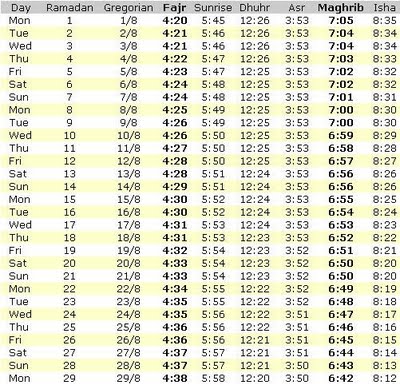
Ramadan in UAE starts from August 01, 2011.
Ramadan prayer timings in Dubai:

A very blessed Ramadan to all followers and readers of Dubai Expat Blog. Ramadan Kareem.
Ramadan is a month of socializing, people do suhour and iftar together, there are iftar tents and majlis everywhere – not to mention Taraweeh, the … Read more
Ramadan is one of the holiest months in Islam. Muslims fast during this month and spend the night in congregational prayers called Taraweeh. Ramadan in … Read more
A brainchild of Australian native, Sumayyah Sayed, Ramadan Fridge sharing is back in Dubai. In 2016, when Ramadan Fridge sharing initiative was started, the organizers … Read more
One of the attractions of Ramadan is the Iftar, the meal taken at sunset to break day long fast. Every Ramadan the hotels, restaurants and … Read more
Ramadan, a month full of giving, generosity and care. This notion comes to life when we witness the Iftar at Ali Rashid Lootah mosque near … Read more
Five thousand Dubai labourers will be given packages of food and other essential items this weekend as part of a charity project. The Ramadan Care … Read more

Ramadan in UAE starts from August 01, 2011.
Ramadan prayer timings in Dubai:

A very blessed Ramadan to all followers and readers of Dubai Expat Blog. Ramadan Kareem.

Guess what? If you are fasting, don’t ride Metro near Maghrib time. Why? Because, ending your fast inside the Metro trains during Ramadan will invite a fine.
Ramadan Abdullah, Director of Operations of Rail Agency at the RTA, said: “Eating is not allowed on the trains. And this rule won’t change. Anyone inside the train who wants to end his fast can just disembark at the next station. People can sit on the chairs in the platforms and eat.”
Yes. The RTA believe its Metro is more precious than fasting Muslims.
Also, parents who wish to feed their babies must also disembark at the nearest Metro station — but should not feed their baby inside the trains.
“Honestly, we’ve seen someone feeding a child on the train and wiping her hand on the seat. Others wouldn’t like to use dirty seats. Hence, we would like to protect other commuters by avoiding possible spillage of food or mess created while eating. We also have to protect our assets. We don’t want to end up with dirty and smelly units.”
Is this how the trains managed in civilized parts of the world?